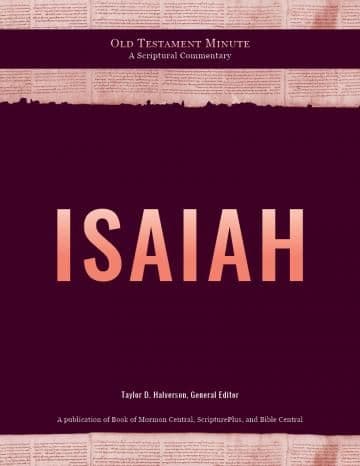Book
66 Chapters

Isaiah 27
Isaiah prophesies of the gathering of Israel in the last days. Therefore, the chapter pertains to us, members of the Church. The Lord acts with great power: He punishes Satan (27:1); He carefully maintains and waters the vineyard (the house of Israel; compare 5:1–6) “night and day” (27:3); He protects us from our enemies (symbolically called “thorns and briars”) (27:4); He provides us with peace (27:5); and He gathers us, the house of Israel, “one by one” (27:12). A covenantal relationship is implied in this chapter: the Lord blesses us greatly and makes us (the vineyard) fruitful (27:6), and in return we will share the gospel (27:6) and worship Him in His holy temple (27:13).
In that day. In the last days, the time period of the Restoration of the gospel. His hard, great, and strong sword. The Lord will punish and slay Satan with His sword; the Lord also uses the sword to execute justice on the wicked (34:5–6; 66:16; Ezekiel 5:17; 6:3; 21:3; Revelation 19:15). The sword, of course, is symbolic. Leviathan, a fleeing serpent . . . monster. Satan is Leviathan (the meaning of this term is uncertain), the serpent, and the monster (2 Nephi 2:18; Revelation 20:1–2)—all fitting terms for Satan and his deceptive and treacherous objectives. He is also a “coiling serpent,” meaning that he lies in wait like a venomous snake to strike out at his victims.
delightful vineyard. The house of Israel (5:7).
I, the Lord, am its keeper. The Lord is the vineyard’s owner and keeper; see 5:1–7.
thorns and briars. Appropriate symbols of Israel’s enemies (Numbers 33:55; Ezekiel 28:24) because thorns and briars can prick, discomfort, and pierce. I will march against them in battle. God battles against Israel’s enemies and destroys them (“burn them”) as easily as a farmer burns thorns and briars that are overtaking his field or garden.
Jacob will take root; Israel will blossom and flower. In the last days, the Lord’s covenant people, Israel, portrayed as a fruitful vineyard, will bless the world by sharing its fruit, symbolic of literal offspring (2 Nephi 3:4; Genesis 30:2) or the Lord’s gospel.
Has He smote {Israel} as He smote those who smote {Israel}? Meaning, has God smitten Israel as God smote Israel’s enemies, which smote Israel? No. Although God smote Israel for its rebelliousness, He did not completely destroy it as He did Israel’s enemies (for example, Assyria, Babylon, and so forth).
the iniquity of Jacob be atoned for. God’s chastisements upon Israel—warfare, exile, famine, and the like—will serve to purge Israel from her iniquity: “I, the Lord, will contend with Zion . . . and chasten her until she overcomes and is clean before me” (Doctrine and Covenants 90:36). chalkstones crushed to pieces. Chalkstone, a soft stone that breaks and crumbles easily, symbolizes the complete destruction of false worship and idolatry. Asherim (Hebrew plural for Asherah; compare also Asherot) was a Canaanite goddess or cultic pole that represented her. God commanded ancient Israel, “You shall break down their [Canaanites’] altars and dash in pieces their pillars and chop down their Asherim and burn their carved images with fire” (Deuteronomy 7:5; see also Exodus 34:13).
For a fortified city is solitary. These verses pertain to places that are fortified by mortals but are destroyed and made solitary by the Lord. They will become “deserted and forsaken . . . like the wilderness.” Why? Because their inhabitants were “a people without understanding.”
And in that day, the Lord will thresh. Isaiah speaks poetically, with many symbols. The Lord is a farmer who, in the last days, will thresh out grain. The precious grain symbolizes a covenant people, who is the Lord’s threshing (21:10). He will thresh the entire world (represented by the words “from the {Euphrates} river to the wadi of Egypt”), meaning that greater area surrounding ancient Israel. you will be gathered one by one, O people of Israel. Just as a farmer gathered the precious grain, one by one.
a great ram’s horn will be blown. The Lord calls on the nations to gather to the gospel “by the mouth of [His] servants, and by the ministering of angels, and by [His] own voice . . . and by the great sound of a trump” (Doctrine and Covenants 43:25; Matthew 24:31; Doctrine and Covenants 49:23). those lost in the land of Assyria/scattered in the land of Egypt will come. Even people who are located in the nations who once fought against Israel will come and participate in the gathering. they will worship the Lord on the holy mountain, in Jerusalem. The holy mountain symbolizes the Lord’s temples. Temples and temple worship have always been a vital aspect of the gathering.
Book
66 Chapters
Items in the BMC Archive are made publicly available for non-commercial, private use. Inclusion within the BMC Archive does not imply endorsement. Items do not represent the official views of The Church of Jesus Christ of Latter-day Saints or of Book of Mormon Central.